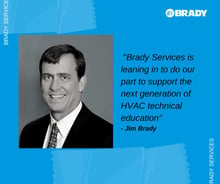While the terms sustainable, energy-efficient, and green building are broadly used to describe construction that centers on building performance, there’s no national program that focuses on career development in building performance. That’s why North Carolina Building Performance Association (NCBPA) Founder and CEO Ryan Miller is investing heavily in developing the building performance workforce in the state.
.jpg?width=217&name=NCBPA%20ABS%20Quote%20(1).jpg) “There’s no one association or organization at a national level that is specifically focused on this. It would seem that such a major, important and valuable resource that answers the question, ‘how do I find the right building performance job for me’ would be available from our industry, but it’s not, yet,” Miller said. “We are a unique industry for what we do and how we do it, no doubt. But our lack of workforce resources continues to keep us on a lower playing field than most other related industries, and this is what we’re working to change.”
“There’s no one association or organization at a national level that is specifically focused on this. It would seem that such a major, important and valuable resource that answers the question, ‘how do I find the right building performance job for me’ would be available from our industry, but it’s not, yet,” Miller said. “We are a unique industry for what we do and how we do it, no doubt. But our lack of workforce resources continues to keep us on a lower playing field than most other related industries, and this is what we’re working to change.”
Assessing Initiatives
 NCBPA’s current method for evaluating the efficacy of its workforce development resources is to “test the test.” The association is advocating to develop a proof of concept “toolkit” for a career as a residential insulation installer that sufficiently documents available and needed career resources for this trade. Doing so will have a positive impact on shaping the future workforce in North Carolina and nationally.
NCBPA’s current method for evaluating the efficacy of its workforce development resources is to “test the test.” The association is advocating to develop a proof of concept “toolkit” for a career as a residential insulation installer that sufficiently documents available and needed career resources for this trade. Doing so will have a positive impact on shaping the future workforce in North Carolina and nationally.
Residential insulation installation is an important trade in North Carolina’s building performance industry, employing some 6,000 workers that cross the clean energy and construction industries. North Carolina’s construction industry has very little, if any, statewide workforce resources that support the insulation trade. By using insulation as a proof of concept, the residential building industry will receive workforce development resources that can be tailored to other developing trades as well. Proof of concept activities will entail:
- Assessing currently available education and training programs that support readiness for jobs in residential insulation. Existing curricula and programs related to construction, building science, energy efficiency, sustainability technologies, and other related educational areas will be assessed. Where possible, new curricula and educational resources will be developed.
- Developing career pathways for students and faculty to follow that lend themselves to improving career awareness opportunities for jobs in residential insulation.
- Piloting the development of new resources that support companies, students, and workers in increasing the number of interested workers in the sector. Consideration will be provided to both high school and college students as well as working-age adults that are unaware of the job and career opportunities in these trades.
- Improving existing apprenticeship programs that relate to residential insulation and developing new programs that more closely align with these industry roles. Existing on-the-job training checklists and other resources that support combined classroom and workplace learning will be assessed and improved.
- Developing resources that improve the sector’s abilities to reach target workers from more diverse backgrounds, resulting in improved diversity, equity, and inclusion in the overall industry while increasing the retention of current workers as well as the recruitment of future workers.
- Supporting the expansion of classroom and training facilities at community and technical colleges across North Carolina that support education and training in these trade roles.
A Steady Flow of Employees
A successful, targeted workforce development program for particular trades could provide the basis for a nationwide effort to implement a scalable, repeatable program to maintain a consistent flow of employees in the building trades. In a building industry that has been challenged to find qualified tradespeople to keep up with building demand, that is a compelling prospect.
In our next post, we’ll look at how state and national organizations can participate in and lead these kinds of efforts.





